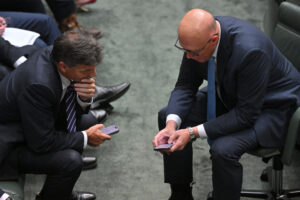If the Albanese government were looking for some political cover to remove the chokehold of the $254 billion stage three income tax cuts on the budget, it could do worse than look to the International Monetary Fund’s latest advice.
As millions of Australians struggle to make ends meet due to cost of living increases, the federal government is squandering a golden political opportunity to fix its economic misstep.
The stage three tax cuts package was a skilful economic and political trap set by the Coalition and Labor walked into it grudgingly, but knowingly, judging it a price it was willing to pay to win the election. But while making a poor decision in opposition is damaging for a political party, continuing to make the same poor decision in government is disastrous for Australians.
First, the economic cost. Coming in at a whopping quarter of a trillion dollars over the next 10 years, the stage three tax cuts are a time bomb for future governments that will permanently damage Commonwealth revenue and flatten our progressive income tax system. They were a bad economic idea when they were first introduced, and they are a worse idea in this inflationary economy.
Let’s remember, the stage three income tax cuts were designed by the former Coalition government to overwhelmingly benefit battlers struggling on just $200,000 a year. The bits of the tax cuts that helped low and middle-income earners were only temporary and have already finished; they were the spoonful of sugar that covered the bitter taste of permanent tax cuts that will deliver an extra $9000 a year, every year, to high-income earners.
More than 100 leading economists and tax experts have urged the federal government to reconsider the massive income tax cuts, which are inappropriate for an economy dealing with rising inflation and unaffordable given Australia’s growing public spending needs.
Now the IMF has given the government the green light to re-examine the tax cuts too, urging the government to consider how to “appropriately balance costs on the budget and benefits to the economy”.
Something has gone seriously wrong when Australia’s Labor government is less progressive on tax cuts for high-income earners than both the IMF and the British Conservative Prime Minister Rishi Sunak.
That brings us to the rising political costs of keeping the stage three tax cuts. Yesterday, state health ministers pleaded with the federal government to boost funding for hospitals and to fix the GP crisis. Medicare, aged care, early childhood education, housing, and the NDIS are all part of our growing public spending needs. The rate of JobSeeker is so far below the poverty line that the IMF recommended it be replaced entirely with an unemployment insurance program.
Basically, it argued the JobSeeker payment is so low that it is not enough to sustain demand during economic shocks and does not help to stabilise the economy.
But whether it’s raising the rate of Jobseeker or aged care funding, when budget time rolls around, we are told that in this economy, “we can’t afford even good ideas” because the revenue cupboard is bare. Not so bare we can’t afford $300 billion in income tax cuts to high-income earners, mind you.
This will be the rising political cost for Labor. Every time a good public spending measure is knocked back, it will be compared to the policy of handing an extra $9000 a year to high-income earners.
This raises a bigger consideration for Australia. Australia has a revenue problem, we have a structural deficit, and the tax cuts for high-income earners are about to make it permanently worse. There’s no appetite to cut public spending, which means we need a robust debate about wider economic and tax reforms. Or as the IMF put it: “Comprehensive medium-term tax reforms are needed to meet higher structural spending needs and support economic efficiency and growth”.
It urged a review not just of personal income tax, but also tax exemptions and concessions, something long overdue.
A new report from the Australia Institute shows the $52.6 billion cost to the federal budget of generous superannuation tax concessions is now on par with the cost of the entire aged pension ($55.3 billion), and greater than the total cost of the entire NDIS in 2022-2023.
The fact is super tax concessions for so-called self-funded retirees are costing the budget an absolute fortune, they are not relieving pressure on the aged pension or the budget, they are adding pressure. The 50 per cent capital gains tax discount, negative gearing, and other costly and distorting tax concessions should also be on the table.
If it’s sensible, Labor will be looking for ways to open the tax reform debate beyond the narrow parameters set for it by the opposition and the business sector, who will attempt to narrow the economic and tax reform debate to make it appear like Australians have few choices.
The Labor government needs to be aware that the public will be weighing the opportunity cost of spending a quarter of a trillion dollars on tax cuts to the wealthy against increased public spending on health, education, childcare, aged care, from now until the tax cuts come in in 2024.
Unfortunately for the government, the political and economic costs of the stage three tax cuts have risen with inflation, just as surely as the cost of rent, gas and electricity. Prior to the federal election, Labor made a poor economic decision to avoid making a politically difficult one. And now, after the election, the Labor Government has the choice of proceeding with stage three tax cuts for the wealthy or spending a quarter of a trillion dollars targeted at helping people who really need it. Pretty straightforward really.
Between the Lines Newsletter
The biggest stories and the best analysis from the team at the Australia Institute, delivered to your inbox every fortnight.
You might also like
The Liberal Party defies its own history on tax
For decades, the Liberal Party has prided itself on being the “party of lower taxes”.
Stage 3 Better – Revenue Summit 2023
Presented to the Australia Institute’s Revenue Summit 2023, Greg Jericho’s address, “Stage 3 Better” outlines an exciting opportunity for the government to gain electoral ground and deliver better, fairer tax cuts for more Australians.
5 ways and 63 billion reasons to improve Australia’s tax system
With a federal election just around the corner, new analysis from The Australia Institute reveals 63 billion reasons why our next Parliament should improve the nation’s tax system.


